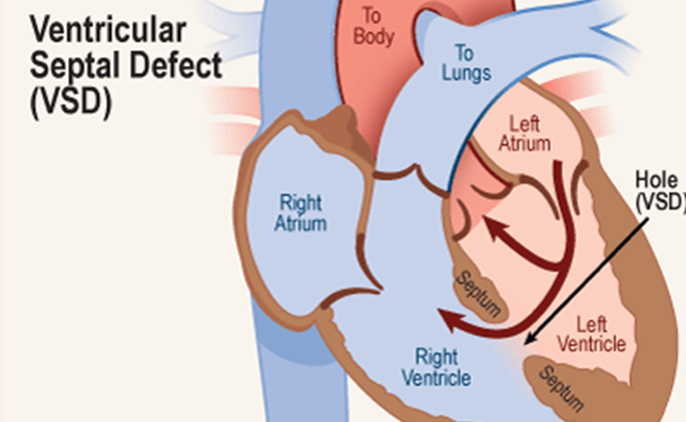Ventricular Septal Defect (VSD)
It is a congenital defect in which there is a hole in the lower chambers of the heart which results in the mixing of oxygenated and deoxygenated blood. Small defects may close in early childhood but long-term defect needs surgical treatment.
Symptoms
- Fatigue
- Breathing problems
- Swelling in legs, belly, or feet
- Rapid heartbeat or skipped beats
- Heart murmur
Causes
- Genetics
- Lifestyle changes
- Use of certain medicines
- Drug usage
Complications
- Stroke
- Heart failure
- Early death
- Arrhythmias
- Pulmonary hypertension
Treatment
- Small defects do not need any treatment.
- For large ventricular septal defects surgery is recommended.
- Two methods are available:
- Catheter-based repair– A thin tube is guided into the vessel & a mesh patch is passed through it to the heart. Gradually, heart tissue grows around this mesh, and the hole is permanently closed.
- Open-heart surgery- An incision is given in the chest to access the heart and patches are placed on the hole to close it.
Prevention
- Review medical history
- Discuss your health during pregnancy
- Get vaccinated for measles during pregnancy
Some Facts about Ventricular Septal Defect Surgery
| Number of days taken for initial investigations | 2 |
| Number of days in ICU | 5 |
| Number of days in Room | 4 |
| Follow up days | 7 |
| Total days required to stay overseas for treatment | 18 |
Role of Parishay Healthcare in planning treatment for Ventricular Septal Defect!
After you contact us, a relationship manager is allocated to you who arranges a teleconsultation with an excellent healthcare provider according to your need. After your consent, we move forward with your untroubled travel arrangements, treatment plan, and follow-up care.
For more information visit our website www.parishayafrica.com


